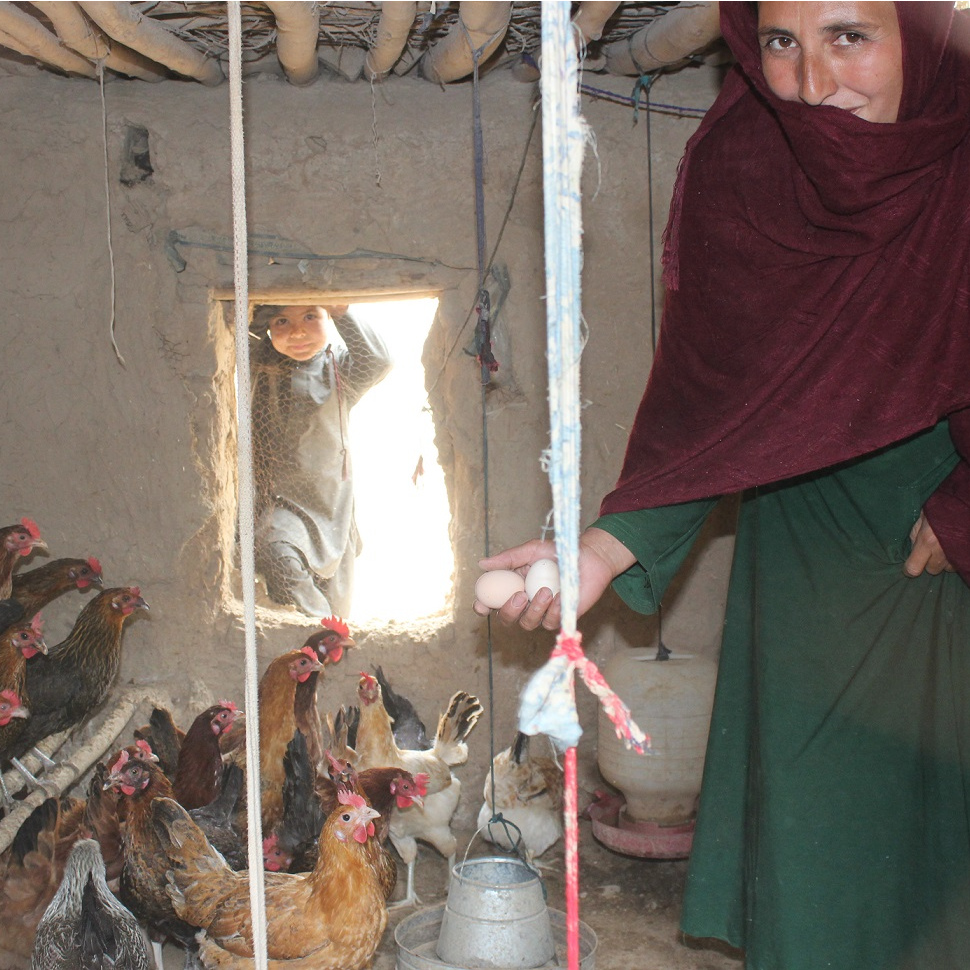
Meet Mahgul, who hatched a plan after her forced relocation
To Mahgul, Pakistan was home. It was where she was born to parents who sought refuge from the Soviet-Afghan War in the late 1980s. It was where she met the man who became her husband and where she gave birth to her first two children.
That all changed nine years ago when the Pakistani government destroyed the refugee camp where she and her family had been living. They were forced over the border to Mahgul’s parents’ homeland, from where the government assumed she had come.
“We didn’t know anything about Afghanistan except that our families were originally from there,” Mahgul said. “We were forced to leave Pakistan and came to Afghanistan, but we didn’t have anything here: no home, no family and no relatives.”
Mahgul and her family were forced to start anew, and now, with help from Hand in Hand, their once-dim future is shining bright. Not only has she settled into her new home in Balkh province, she has learned how to raise chickens, earning an income that has helped support her family.
Balkh Province, Afghanistan
A continuing crisis
Three million people arrived on Europe’s shores hungry and desperate for work during the migrant crisis of 2015-16. Imagine, however, if more than 50 million people had arrived instead, and that Europe was one of the most impoverished places on earth, lacking not only the ability to house those who arrived but also the ability to care for and support them.
That, proportionally, is the problem facing Afghanistan, which has seen millions of people flee their homes over the past three decades because of conflict. More than 2.5 million people are expected to arrive in the country over the next two years from places such as Pakistan and Iran, even as another 1.8 million internally displaced people (IDPs) settle elsewhere in the country to escape intensified conflict.
Establishing a home
Mahgul and her family spent more than a year in Afghanistan living in a tent before they, and other migrants, were taught by the UN Refugee Agency how to build shelter. Mahgul’s husband found work as a shopkeeper, and they settled into their new lives in the village of Mahajir Qeshlaq, in the Sholgara district of Balkh province.
But for Mahgul, now 30, the desire to continue to make a better future for her family remained strong. Last year, she learned about Hand in Hand Afghanistan and, excited by the prospect of earning an income, joined the programme to learn the basics of poultry farming.
Over five days, Mahgul learned not only how to properly raise and care for chickens, but also how to run and develop a business and manage her finances. At the end of her training, she received her own chickens, as well as feed and a number of tools, as part of an enterprise start-up kit designed to help her succeed.

Forging a future
Not even a year into her new endeavour, Mahgul’s farm has grown to include 32 chickens that produce an average of 20 eggs each day. Though some are kept to help feed her family, she sells most of them, earning a monthly income of nearly 3,000 AFN (US $40).
That income has not only helped her support her family, but it has also allowed her to help put her children through school.
Less than a decade ago, Mahgul was left helpless as she and her family were forcibly deported from her home. Now, she has not only been empowered to forge her own future, but she has cultivated one for her children as well.
Mahgul’s results
Settled after forced relocation to Afghanistan
Increased monthly income from 0 to 3,000 AFN (US $40)
Able to contribute to school fees for her children
Next case study: Meet Gloria, the former refugee growing crops – and profits
